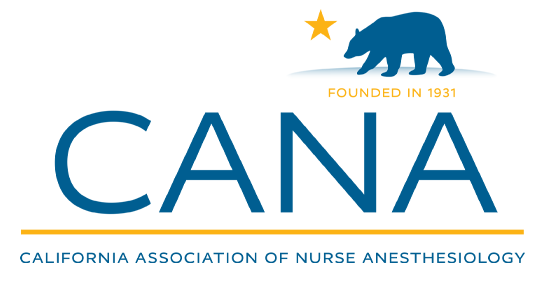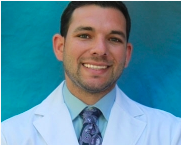The California Association of Nurse Anesthesiology (CANA) is proud to announce the creation of a NEW Online Education Platform open to all CRNA professionals. This platform provides an on-demand, affordable, easy way to earn Class A credits (certified and approved by AANA).
This new Online Education Platform is the latest in our continuing efforts to increase educational and networking opportunities for CRNA professionals and CANA members. By taking courses through CANA, not only do you save money, but you also help to support our local efforts to protect the scope of CRNA practice on the State and National levels, and continue our commitment to ensuring safe, cost-effective anesthesia care for patients. Our online education is open to CANA members and professionals who are not CANA members, such as AANA members from other states.
CANA is currently offering five sessions for Class A CE credit, starting at just $25, as well as three Class B CE credit session complimentary to those interested. Each session was originally presented at the CANA Web Conference on May 2, 2020 and the Virtual Fall Meeting 2020 on October 17-18, 2020.
Credit Reporting: The online system will automatically provide you with a downloadable CE certificate and report your credits to the AANA upon completion.
Getting Started: Click on each session title below to learn more about our online offerings, then based on your membership status select the correct pathway to access the online education platform. Enroll in the courses you would like to take, watch the video recording, and complete the post-test and evaluation form. It’s that simple!
Emotional Intelligence in Healthcare and Implications for Certified Registered Nurse Anesthetists (CRNAs)
Briefly discuss emotional intelligence (EI) and the four dimensions of EI. Review the literature of EI in healthcare. Discuss the research regarding the relationship between EI and burnout syndrome and the implications for Certified Registered Nurse Anesthetists (CRNAs).
Learner Objectives:
- Identify the four dimensions of emotional intelligence (EI) and how the four dimensions are interrelated.
- Discuss the importance of emotional intelligence (EI) in healthcare and the implications for healthcare, specifically CRNAs
This program has been prior approved by the American Association of Nurse Anesthetists for 0.75 Class A CE credits.
Fee: $25
Lessons Learned at the Sharp End of Care. The Aftermath of Adverse Events: Our Voices are Finally Heard!
Most health care professional will experience an adverse event/near miss and/or patient death in the course of their career. Policies and procedures on how to handle the aftermath of these events and the emotional well-being of the health care professional have not been mandated. If a “business as usual” mentality is adopted, this may lead to dysfunctional behavior, subsequent harm to the health care professional and suboptimal care for subsequent patients. This lecture provides an overview of the impact that a memorable event may have on the health care professional and the patient safety implications.
Learner Objective:
- Increase awareness and knowledge surrounding the impact of a memorable event may have on a health care provider and identify ways of coping.
This program has been prior approved by the American Association of Nurse Anesthetists for 0.75 Class A CE credits.
Fee: $25
The ABCs of Reading a CXR
|
The Business of Anesthesia - A Panel Discussion
Can a CRNA provide exceptional care to patients AND be a fiscally productive business owner? Learn from two leading CRNAs as they discuss how to run your business to be efficient, revenue generating, and safe, especially during a worldwide pandemic.
Learner Objectives:
- Define what equipment must be present to perform a safe anesthetic, in private practice offices.
- Know three key factors every CRNA should understand when billing for their services.
- Know how to keep yourself and the patient safe during the COVID-19 pandemic, in independent practice settings.
This program has been prior approved by the American Association of Nurse Anesthetists for .25 Class A CE credits.
Fee: $15
Finding Strength in Uncertainty: Strategies for CRNAs and SRNAs

CWC from left to right, starting from the top: Charles Griffis, PhD, CRNA; Tiffany Uranga, DNP, CRNA; Anna Lai Mark, CRNA; and Emily J Marsh, BSN, RN, SRNA.
The CANA Wellness Committee, CWC, will explore human response to situations of uncertainty and crisis, such as COVID19, and offer strategies for both the CRNA and SRNA to help build/rebuild resilience and counterbalance stress and boost overall wellbeing, personally and professionally.
Learner Objectives:
- Acknowledge natural human responses to uncertain and critical situations.
- Identify physiologic and psychologic signs and symptoms of increased stress and weakened resolve, especially during uncertainty and crises.
- Explore physiologic and psychologic stressors specific to the anesthesia provider and anesthesia student in response to uncertain and critical situations; including but not limited to practice-training uncertainty, personal safety, & life balance.
- Describe wellness-enhancing and counterbalancing modalities to mitigate stressors and build resilience during uncertainty and crises.
- Highlight the purpose of the CANA Wellness Committee (CWC) and how to connect with CWC committee members.
- Outline additional wellness resources and strategies offered by CWC and AANA for personal resilience and general wellbeing both for maintenance care and during uncertain times.
This program qualifies for up to 0.5 Class B CE credits.
Fee: Complimentary
Nurse Anesthesia, Black Maternity Mortality and COVID19: Impact on Communities of Color and Mitigation
In this session, Dr. Lena Gould, Founder & CEO of the Diversity in Nurse Anesthesia Mentorship Program, will take a deep dive into the history of racial disparity in the healthcare industry and patient care, the impact of racism in the nurse anesthesia profession specifically, and strategies to mitigate the negative impacts racial disparity has within communities of color.
Learner Objectives:
- Identify the population and cultural shifts in the United States
- Describe historical impact of diversity in Nurse Anesthesia and healthcare profession
- Discuss relevant impact of racism, racial disparities in nurse anesthesia profession & COVID19
This program qualifies for up to 0.75 Class B CE credits.
Fee: Complimentary
Lessons Learned from Delivering Anesthesia in Austere Locations
Performing anesthesia in austere environments can be very challenging to the provider. Delivering anesthesia in these environments without basic resources such as running water to lack of anesthesia equipment or medications change the way we think about providing the anesthetic. The results and lessons learned from performing anesthesia in these challenging environments present opportunities for providers to implement in their practice in both small rural practices as well as larger metropolitan areas.
Learner Objectives:
- Understand current challenges of performing anesthesia in austere environments
- Identify relationships of performing anesthesia in austere environments in comparison to metropolitan areas
- Identify current macro and micro trends in performing anesthesia in austere environments
- Evaluate and apply current tools of the trade to successfully manage patients in both austere and metropolitan environments
- Synthesize current information and apply to your patients today
This program qualifies for up to 0.50 Class B CE credits.
Fee: Complimentary
The Effect of the Coronavirus Pandemic on Substance Use Disorder Prevalence and Treatment
The presentation will consist of a 1-hour slide presentation on the topic of the pandemic effects on the treatment and prevalence of SUD. We will introduce the topic, then describe various negative effects that the public health safety needs of providing care during the pandemic has had on the treatment modalities and incidence of substance use disorder (SUD). We will urge members affected by SUD to seek help, and encourage them that SUD can be treated and helped, despite the pandemic. Each member of the CWC will speak, narrating selected sections of the slides.
Learner Objectives:
- Describe the negative effects the pandemic has had upon the disease of substance use disorder (SUD).
- Personal and professional sources of help will be identified for members in distress.
This program qualifies for up to 0.75 Class B CE credits.
Fee: Complimentary
ERAs OFA Administrative Barriers to Practice Implementation
This presentation highlights anticipated barriers in regards to implementing an ERAS and opioid sparing guideline into your perioperative environment.
Learner Objectives:
- Anticipate barriers to implementing new protocols for ERAS/ OFA
- Offer solutions in regards to anticipated resistance to change
This program qualifies for up to 0.50 Class B CE credits.
Fee: Complimentary
Know Your CA CRNA Practice Better Than Your Contractor
Have you ever been in a situation where you were asked to sign an employment agreement, but just thought, “This doesn’t seem right.” Using an actual form a CRNA was asked to sign, Melanie Rowe, MSNA, CRNA, will review the current state of the CRNA practice in CA and how to evaluate a potential contractor’s or employer’s level of knowledge of CA CRNA scope of practice, especially, when it’s clear they do NOT understand the state statutes governing the practice.
Learner Objectives:
- Evaluate potential contractors and employers of their knowledge of CA CRNA Scope of Practice and resource allocation for their edification.
This program qualifies for up to 0.50 Class B CE credits.
Fee: Complimentary
Post Masters Degree Panel Presentation
This session is an introduction to the various Advanced Professional/Doctorate degrees in Nursing or Nurse Anesthesia that are currently pursuable by the Certified Registered Nurse Anesthetist. A panel of CRNAs from each respective discipline will discuss the path to their chosen degree, along with examples of what each degree provides, and discussion on how the participants have implemented it within their career. This session aims to demystify what is possible beyond a Master’s Degree and to forecast which professional avenues each postmaster’s degrees may be able to open.
Learner Objectives:
- Forecast which professional avenues each postmaster’s degrees may be able to open
- Have an understanding of the various Post-Master’s Degrees in Nursing or Nurse Anesthesia and other Professional Degrees available to CRNAs
- Recognize the difference between each Post-Master’s Degrees in Nursing or Nurse Anesthesia and other Professional Degrees
This program qualifies for up to 1.00 Class B CE credits.
Fee: Complimentary
The Future of Our Profession - AA Transitioning to CRNA and Canadian Healthcare Transitioning to CRNA
The nurse anesthesia profession continues to grow and transition into progressive healthcare marketplaces nationally and internationally. As the demand for anesthesia care delivery outpaces the supply of anesthesia providers globally, other healthcare economies look to the United States for new innovative methodologies in delivering anesthesia services. In an effort to enhance nurse anesthesia provider output, nurse anesthesia programs embark on transformative methods for producing nurse anesthetists.
Learner Objectives:
- Know the importance of transforming the nurse anesthesia profession in emerging healthcare markets.
- Know the timeline from conceptualization transforming Anesthesiologist Assistants into Nurse Anesthetists.
- Know the expansion of the U.S. model into global healthcare marketplaces for Nurse Anesthetists
This program qualifies for up to 1.00 Class B CE credits.
Fee: Complimentary
Taking the Mystery Out of 1099 Work
During this session you will be taught how to best strategize and take advantage of current tax laws in order to optimize taxes. We will discuss the pro’s and con’s of S-corps, the best way to pay yourself, CRNA specific deductions, retirement plan options and how to keep it all organized.
Learner Objectives:
- Understand how taxes work as a 1099 CRNA
- Understand if you should incorporate
- Have the knowledge to confidently find and work with a professional to help you file your taxes.
- Know the expansion of the U.S. model into global healthcare marketplaces for Nurse Anesthetists
This program qualifies for up to .25 Class B CE credits.
Fee: Complimentary
Sign up now!
Click one of the links below purchase access to the online education sessions. Please note that the log-in account is separate from the CANA website. If it is your first time accessing this education platform, please click “Create An Account” to set up a username and password. If you have purchased education sessions before, you can simply click “Log In” to proceed.














